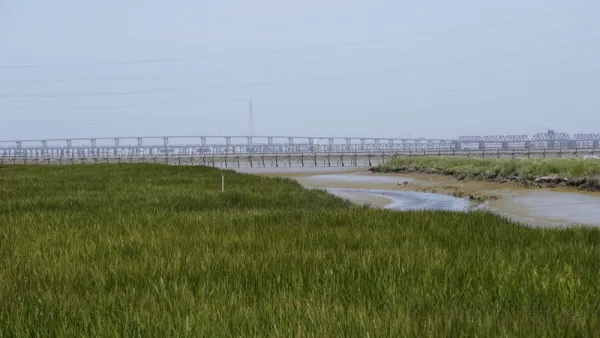After passing the House earlier on a 412-4 vote, the Senate voted 91-7 on May 22 to pass a $12.3 billion water infrastructure bill known as Water Resources Reform and Development Act. It had been seven years since the act was last reauthorized.
"The Senate on Thursday (May 22) voted 91-7 to pass a $12.3 billion bill that approves infrastructure projects and aims to boost U.S. ports and waterways," write Ramsey Cox and Keith Laing on the historic passage of the the Water Resources Reform and Development Act (WRRDA).
Normally, the act is passed every two years, but no action had been taken since 2007 according to an article penned by Water Resources and Environment Subcommittee Chairman Bob Gibbs (R-Ohio) of the House Transportation & Infrastructure Committee for The Daily Record, Wooster, Ohio.
"WRRDA is the vehicle that provides reforms and funding decisions for our nation’s maritime transportations systems. This includes construction of locks and dams on our inland waterways, maintenance dredging of our nation’s ports and harbors, planning and construction of flood control projects to protect our communities, and ecosystem restoration to improve the environment and wildlife habitat."
The legislation, H.R. 3080, which contains no earmarks according to a press release by Speaker John Boehner, had passed the House on Tuesday on a 412-4 vote. [See House press release.] Technically, both houses approved the WRRDA Conference Report because each had "passed separate versions of the water resources legislation last year," writes The Hill's Cristina Marcos.
Conference negotiations lasted for six months as lawmakers hashed out differences over how much authority should be granted to the U.S. Army Corps of Engineers to select which water projects should get funding.
Legislators of both parties praised the bill's bipartisanship.
"This legislation is a reminder — an unfortunately stark reminder — that given a chance to work together in a bipartisan fashion, we can produce results for the American people," said Rep. Nick Rahall (D-W.Va.), the ranking member of the House Transportation and Infrastructure Committee.
It will be interesting to see if the House can repeat that spirit on the critical reauthorization of the transportation legislation known as MAP-21. So far, the track record looks good with its unanimous passage in the Senate Environment and Public Works Committee on May 15. The House Transportation and Infrastructure Committee has yet to take the matter up.
FULL STORY: Senate sends $12.3B water projects bill to Obama’s desk

Analysis: Cybertruck Fatality Rate Far Exceeds That of Ford Pinto
The Tesla Cybertruck was recalled seven times last year.

National Parks Layoffs Will Cause Communities to Lose Billions
Thousands of essential park workers were laid off this week, just before the busy spring break season.

Retro-silient?: America’s First “Eco-burb,” The Woodlands Turns 50
A master-planned community north of Houston offers lessons on green infrastructure and resilient design, but falls short of its founder’s lofty affordability and walkability goals.

Test News Post 1
This is a summary

Analysis: Cybertruck Fatality Rate Far Exceeds That of Ford Pinto
The Tesla Cybertruck was recalled seven times last year.

Test News Headline 46
Test for the image on the front page.
Urban Design for Planners 1: Software Tools
This six-course series explores essential urban design concepts using open source software and equips planners with the tools they need to participate fully in the urban design process.
Planning for Universal Design
Learn the tools for implementing Universal Design in planning regulations.
EMC Planning Group, Inc.
Planetizen
Planetizen
Mpact (formerly Rail~Volution)
Great Falls Development Authority, Inc.
HUDs Office of Policy Development and Research
NYU Wagner Graduate School of Public Service


























